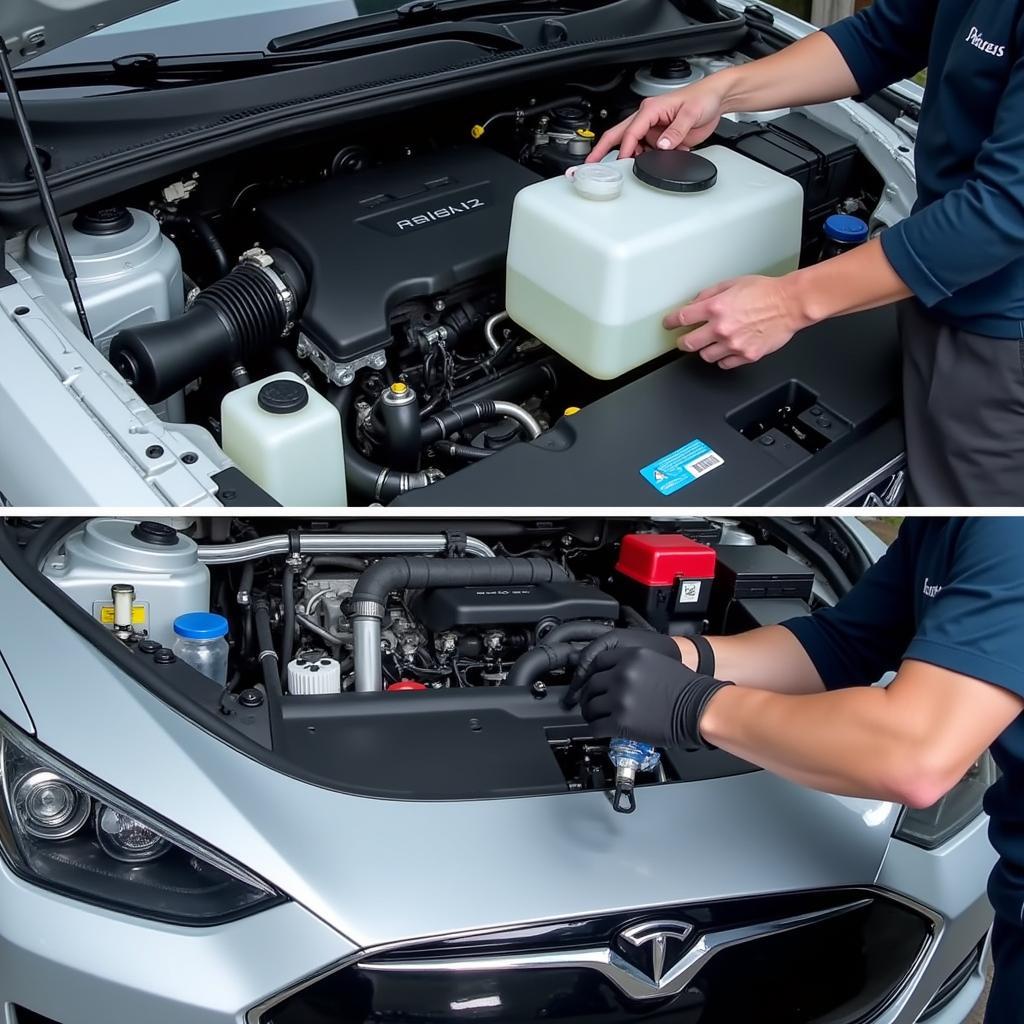Electric vehicles (EVs) are revolutionizing the automotive industry, but their maintenance needs differ from traditional gasoline cars. This guide explores essential maintenance for electric cars, providing valuable insights for owners, repair shops, and technicians.
Similar to a car maintenance book free download, this guide provides essential information about EV maintenance. One key difference is the absence of an internal combustion engine (ICE). This simplifies maintenance significantly, eliminating the need for oil changes, spark plug replacements, and exhaust system repairs. However, other components require attention.
Key Areas of Electric Car Maintenance
Maintaining an EV involves focusing on specific components crucial for performance and longevity.
Battery Care
The battery is the heart of an EV. Proper care extends its lifespan and optimizes performance. Avoid extreme temperatures, as they can impact battery health. Regularly check the battery’s state of charge and avoid completely depleting it.
What’s the most important aspect of EV battery maintenance? Maintaining the correct temperature range is vital for optimal performance and longevity.
Brake System Maintenance
Regenerative braking in EVs reduces wear and tear on traditional brake pads. However, regular inspections are still necessary. Check for brake fluid leaks and ensure the brake pads and rotors are in good condition. Brake fluid should be changed according to the manufacturer’s recommendations.
How often should you check your EV’s brakes? While regenerative braking reduces wear, regular inspections are recommended, ideally every 12 months or as advised by the manufacturer.
Tire Maintenance
Maintaining proper tire pressure is crucial for efficiency and range. Under-inflated tires increase rolling resistance, reducing the distance your EV can travel on a single charge. Regularly rotate your tires to ensure even wear. Consider investing in low rolling resistance tires specifically designed for EVs.
Why are low rolling resistance tires important for EVs? These specialized tires minimize friction with the road, maximizing the electric range and improving efficiency.
Cooling System Maintenance
EVs have a cooling system for the battery and power electronics. Ensure the coolant level is correct and check for leaks. Like conventional cars, the coolant needs periodic replacement. A properly functioning cooling system is essential to prevent overheating and damage to critical components.
How often should you check the coolant in your EV? Regularly check the coolant level, and follow the manufacturer’s recommendations for replacement intervals.
 Electric Vehicle Cooling System Maintenance
Electric Vehicle Cooling System Maintenance
Finding Help and Information
For more detailed information about car maintenance equipment, check out this helpful resource: car maintenance equipment list. Understanding the costs associated with maintaining specific vehicles, such as the Ambassador, can be insightful, as illustrated in this ambassador car maintenance cost analysis. This can provide valuable context for comparing EV maintenance costs. Learning from specialized maintenance programs, like the one detailed in military armored cars maintenance program, can offer insights into the rigor and attention to detail required for complex vehicles, although EVs are generally less complex.
“Consistent maintenance is essential for preserving the lifespan and performance of any vehicle, especially electric cars. Neglecting routine checks can lead to costly repairs down the line,” says David Miller, Senior Automotive Engineer at Autotippro.
Maintenance on Electric Cars Forum: Your Questions Answered
“Many EV owners underestimate the importance of tire maintenance. Proper inflation significantly impacts range and efficiency,” adds Sarah Johnson, Lead EV Technician at Autotippro.
This guide offers a starting point for understanding maintenance on electric cars forum discussions. For owners of classic cars, understanding their specific maintenance needs is essential, as highlighted in this resource about classic car maintenance auburn.
Conclusion
Regular maintenance is essential for optimal performance, safety, and longevity of your electric vehicle. By focusing on key areas like the battery, brakes, tires, and cooling system, you can ensure your EV runs smoothly for years to come. We encourage you to connect with us at AutoTipPro for any assistance or further questions. Our team is available at +1 (641) 206-8880 or you can visit our office at 500 N St Mary’s St, San Antonio, TX 78205, United States. We’re here to support your EV maintenance journey.
FAQ:
- How often should I charge my electric car? It depends on your driving habits and the vehicle’s range, but generally, charging overnight or when the battery is around 20% is recommended.
- Do electric cars need oil changes? No, electric cars do not require oil changes because they don’t have internal combustion engines.
- How often should I rotate my EV’s tires? Consult your owner’s manual, but generally, tire rotation is recommended every 6,000-8,000 miles.
- What type of coolant does an EV use? Consult your owner’s manual for the specific type of coolant recommended for your EV model.
- What are the signs of a failing EV battery? Reduced range, slower charging times, and warning lights on the dashboard can indicate a battery problem.
- How much does EV maintenance cost compared to gasoline cars? Generally, EV maintenance is cheaper due to fewer moving parts and the absence of oil changes, transmission fluid flushes, and other ICE-related services.
- Where can I find qualified technicians to service my electric car? Dealerships and specialized EV repair shops offer qualified technicians trained to work on electric vehicles.





Leave a Reply